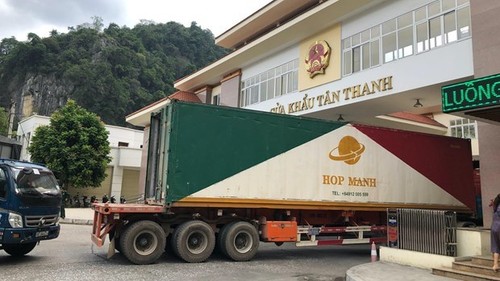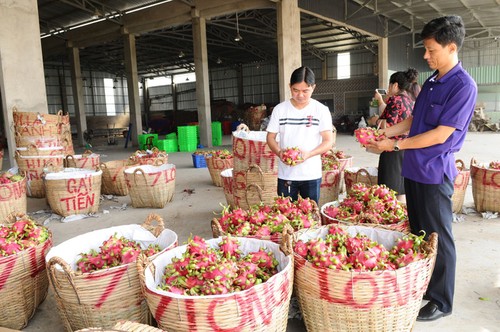 Farm produce are exported via Tan Thanh border crossing in Lang Son province (Photo: Vietnam+) Farm produce are exported via Tan Thanh border crossing in Lang Son province (Photo: Vietnam+) |
Vietnam enjoys a basic tax rate of 0 percent when exporting agricultural products to China. But Vietnamese businesses are facing difficulties in deciding the form of export, because they are heavily dependent on their Chinese partners.
According to China’s technical regulations, Chinese importers must pay tax if they import farm produce through official channels.
As a result, the mode known as goods exchanges among residents along the border is prioritized by both sides.
Dinh Van Thai, who exports agricultural products through Lang Son province, said, “My exported agricultural products are subject to a tax rate of 0 per cent but my Chinese partner will be imposed an import tax rate twice as much as via unofficial channels.”
He took a shipment of blue dragon as an example, “It costs 2 yuan for that shipment if it is imported via unofficial channels. It’s charged nearly 5 yuan through official export channels. Although there may be risks including border congestion and degraded quality, as long as the border is not closed, cross-border trading still profits me after deducting production costs.”
The unofficial export channel is preferred by businesses on both sides because it requires less strict rules on packaging, origin, and types of agricultural products.
But in order to minimize possible risks for Vietnamese businesses as the Chinese authorities are tightening regulations on imported farm produce, Vietnamese businesses must change their perception that China is an easy market.
Nguyen Dinh Dai, Director of the provincial Industry and Trade Department, said the most important thing is that owners of export shipments and agricultural exporters should quickly rearrange their production and improve product quality and packaging standards towards exporting through official channels.
“Official agricultural export depends a lot on production levels and production reorganization. We need to rearrange production to ensure the process and product quality so that we can export our items via official channels in a sustainable manner in accordance to the standards set by importers,” said Dai.
 Domestic agricultural exporters are encouraged to quickly rearrange their production and improve product quality. (Photo: nhandan.vn) Domestic agricultural exporters are encouraged to quickly rearrange their production and improve product quality. (Photo: nhandan.vn) |
Mai Xuan Thanh, Deputy Head of the General Department of Customs, said the customs sector hopes to receive more support from state agencies and business associations to change into official export channels, thus maintaining a larger turnover given the great agricultural product potential in market, capacity, and consumption.
Thanh told VOV, “It’s undeniable that unofficial export channels have promoted agriculture over the years. But it can be very risky.”
In the long run, Thanh said, “Businesses need to ensure the quality, and improve prestige while Chinese partners must do the same. By that way, we can sign contracts for regular supply towards bigger contracts. If we want to maintain a larger turnover, or at least the same as by the old method, it’s necessary to increase exports via official channels.”
At a review conference of the agricultural sector, Prime Minister Pham Minh Chinh underscored the need for a roadmap to resolve obstacles faced by agricultural exporters.
He asked the Ministry of Agriculture and Rural Development, the Foreign Ministry, and the Ministry of Industry and Trade to promote the Vietnamese market and expand the list of Vietnamese farm produce permitted for official export to China.
Localities were urged to strengthen inspection, management, and use of growing area codes, strictly handle violations in packaging to ensure the exported agricultural products meet the standards for export to China, and to be exported to other major markets including Europe, the Republic of Korea, the US, and Japan.